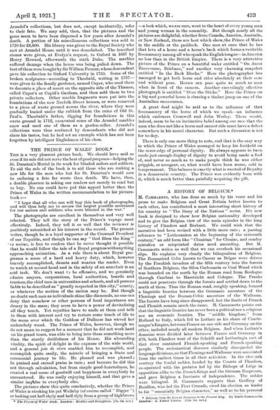111.N. PRINCE OF WALES' BOOK.* THIS is a very pleasant
picture book. We should have said so even if its sale did not serve the best of good purposes—helping the St. Dunstan's Hostel in its work for blinded sailors and soldiers. To aid the sale of the book is to aid those who are making a new life for the men who but for St. Dunstan's would now be enduring a fate far worse than death. We have, then, a double pleasure in asking our readers not merely to read but to buy. No one could have put this appeal better than the Prince of Wales in the written recommendation to his picture- book :— " I hope that all who can will buy this book of photographs, and will thus help me to secure the largest possible assistance for our sailors and soldiers who were blinded in the war."
The photographs are excellent in themselves and very well selected. They tell the story of the Prince's voyage most effectively. Indeed, they tell it so well that the reviewer is positively astonished at his interest in the record. The present writer, though he is a loyal supporter of the Crowned President of our Republic, and though he can say " God Bless the King "
• ex anitao, is free to confess that he never thought it possible that he would follow the tale of a Royal progress withanything approaching animation. As a rule there is about Royal pro- gresses a sense of a hard and heavy duty, which, however bravely accomplished, daunts and wearies the reader. Even to watch at second-hand and in the safety of an armchair is an arid task. We don't want to be offensive, and we genuinely admire mayors, corporations, local authorities, boards and trustees, the chief men in universities and schools, and all persons liable to be described as " greatly respected in this city," county, or whatever the section of the nation may be. But though no doubt such men as individuals shine like diamonds, no one can deny that somehow or other persons of local importance are dreary in the mass; they seem to have a power of devitalizing all they touch. Yet royalties have to smile at them and talk to them with interest and try to restore some touch of life to the scene over which the Goddess of Dullness has waved her melancholy wand. The Prince of Wales, however, though we do not mean to suggest for a moment that he did not work hard on his grand tours, was able to bring into them something more than the sturdy dutifulness of his House. His abounding vitality, the spirit of delight in the expanse of the wide world, and a general joie de vivre enabled him to accomplish, and accomplish quite easily, the miracle of bringing a State and ceremonial journey to life. He pleased and was pleased ; he praised and earned praise in turn ; and because he did this not through calculation, but from simple good-hcartedn.ess, he created a real sense of goodwill and happiness in everybody he encountered. He was really enjoying himself, and that gave a similar imp Ilse to everybody else.
The pictures show this quite conclusively, whether the Prince of Wales is stroking his pet Wallaby (of course called " Digger ") or looking out half shyly and half slyly from a group of highbrows
• The Prince of Wale? Book. _ London : Hodder and Stoughton. Lie. ed. net.]
—a look which, we are sure, went to the heart of every young man and young woman in the assembly. But though nearly all the pictures are delightful, whether from Canada, America, Australia, or New Zealand, those are best which show.the Prince of Wales in the saddle or the paddock. One sees at once that ho has that love of a horse and a horse's back which forms a veritable freemasonry among all who speak the English tongue—in America no less than in the British Empire. There is a very attractive picture of the Prince on a beautiful waler entitled " On Ascot Racecourse, Brisbane," and another very charming snapshot entitled " In the Back Blocks." Here the photographer has managed to get both horse and rider absolutely at their ease and without pose. Horses can pose quite as much as men when in front of the camera. Another exceedingly effective photograph is entitled " Over the Sticks." Here the Prince on a big and powerful horse is clearing a timber jump on one of the Australian racecourses.
A great deal might be said as to the influence of that freemasonry of the horse of which we speak—an influence which embraces Cromwell and John Wesley. There would, indeed, seem to be an instinctive belief among our race that the man who does not like a horse and cannot ride must have a defect somewhere in his moral character. But such a discussion is not for to-day.
There is only one more thing to note, and that is the easy way in which the Prince of Wales managed to keep his foothold on the razor-edge of personal dignity. He always appears to have made just enough display of dignity to avoid being made a fool of, and never so much as to make people think he was either priggish, or arrogant, or, what would have been worse, cold in temperament. This balance is exactly what is wanted of Royalty in a democratic country. The Prince was evidently born with it, which is much better than painfully acquiring the gift.


































 Previous page
Previous page